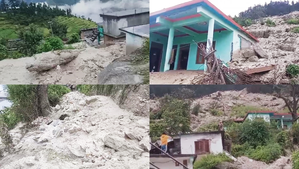Noida 24 August 2024: Tragic events have unfolded in Joshimath, Uttarakhand, as relentless heavy rains have led to the devastation of Pagnau Village. The severe weather conditions have caused widespread destruction, posing significant risks to the lives, property, and well-being of the residents. This incident underscores the region’s vulnerability to extreme weather phenomena and the critical need for effective disaster preparedness and response strategies.
Impact on Pagnau Village
Pagnau Village, located in the hilly terrains of Joshimath, has been severely affected by the heavy downpour. The continuous rain has triggered a series of natural disasters, including landslides, flash floods, and soil erosion, resulting in extensive damage to infrastructure and displacement of residents.
Key Devastations:
- Landslides and Flash Floods: The intense rainfall has caused landslides, burying parts of the village under mud and debris. Flash floods have inundated homes, roads, and agricultural land, making it difficult for residents to navigate and access essential services.
- Property and Infrastructure Damage: Numerous homes, roads, bridges, and public facilities have been damaged or destroyed. The destruction of infrastructure has disrupted daily life and hindered rescue and relief efforts.
- Loss of Lives and Displacement: The severity of the situation has led to casualties and forced many residents to evacuate to safer areas. The exact number of affected individuals is still being assessed, but the impact is undoubtedly significant.
Rescue and Relief Efforts
In response to the disaster, the Uttarakhand government, along with various state agencies and volunteer organizations, has mobilized extensive rescue and relief operations to assist the affected population.
Actions Taken:
- Deployment of Rescue Teams: The State Disaster Response Force (SDRF), National Disaster Response Force (NDRF), local authorities, and volunteer groups have been deployed to conduct search and rescue operations in Pagnau Village and surrounding areas.
- Evacuation and Shelter: Efforts are underway to evacuate residents to safer locations. Temporary shelters have been set up to provide immediate relief, including food, clean water, medical assistance, and shelter for those displaced by the floods and landslides.
- Medical Assistance: Medical teams are on standby to treat injuries and prevent the spread of waterborne diseases. Mobile medical units have been deployed to reach remote and inaccessible areas.
- Supply of Essentials: Relief materials such as food supplies, clean drinking water, blankets, clothing, and hygiene kits are being distributed to those in need.
Government Response and Safety Measures
The Uttarakhand government has taken swift action to manage the crisis and mitigate further risks associated with the heavy rains.
Measures Implemented:
- Weather Monitoring: Continuous monitoring of weather conditions by the Indian Meteorological Department (IMD) and local agencies to provide timely alerts and updates to the public.
- Infrastructure Assessment: Assessing the stability of remaining structures and infrastructure to prevent further collapses and ensure the safety of residents and rescue workers.
- Public Safety Advisories: Issuing advisories to residents to stay indoors, avoid unnecessary travel, and stay away from riverbanks and unstable slopes. Residents are also urged to be vigilant and report any signs of potential landslides or flooding.
- Community Awareness: Conducting awareness campaigns to educate residents about safety measures during heavy rains and landslides, including the importance of early evacuation and adherence to government advisories.
Causes and Contributing Factors
Several factors have contributed to the devastation in Pagnau Village:
- Intense Monsoon Rains: The region experienced unusually heavy rainfall, exceeding normal monsoon levels, which triggered landslides and flash floods.
- Geological Vulnerability: Joshimath’s terrain is naturally prone to landslides due to its steep slopes and geological composition. Heavy rains exacerbate this vulnerability by saturating the soil and weakening slope stability.
- Deforestation and Land Use Practices: Unsustainable land use practices, including deforestation and construction on unstable slopes, have reduced the land’s ability to absorb water and increased the risk of erosion and landslides.

